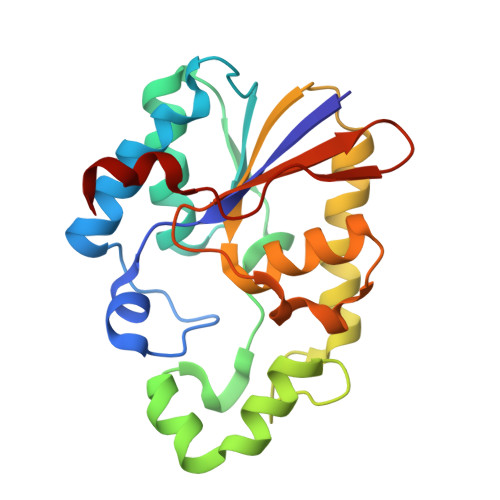Identification of the phosphatase essential for riboflavin biosynthesis in Aquifex aeolicus.
Hoffpauir, Z.A., Lamb, A.L.(2025) J Biological Chem 301: 108443-108443
- PubMed: 40147773
- DOI: https://doi.org/10.1016/j.jbc.2025.108443
- Primary Citation of Related Structures:
9MMH, 9MMI - PubMed Abstract:
The riboflavin biosynthetic pathway uses dedicated enzymes that function exclusively for riboflavin production. Indeed, the pathway is fully annotated, with the exception of an unknown phosphatase that catalyzes the dephosphorylation of 5-amino-6-ribitylamino-pyrimidinedione 5'-phosphate (ARAPDP) to generate 5-amino-6-ribitylamino-pyrimidinedione (ARAPD), which is the substrate for the penultimate enzyme of the pathway, lumazine synthase. Whereas non-specific phosphatases from the haloacid dehalogenase (HAD) superfamily capable of catalyzing the dephosphorylation of ARAPDP have been reported for Bacillus subtilis, Escherichia coli, and Arabadopsis thaliana, we hypothesized that a specific phosphatase may carry out this reaction. Using an anaerobic activity-based screen, two phosphatases from Aquifex aeolicus were identified that dephosphorylate ARAPDP, but only one reconstitutes riboflavin production in a one-pot experiment with the other four enzymes of riboflavin biosynthesis. The first enzyme, annotated as an inositol monophosphatase (IMP), is non-specific, and indiscriminately dephosphorylates ARAPDP along with ribulose 5-phosphate and NADPH, two required substrates of riboflavin biosynthesis. The second enzyme, a histidine family phosphatase (HFP), only dephosphorylates ARAPDP in the one-pot experiment thus facilitating riboflavin formation. The structures of both enzymes were determined by x-ray crystallography to reveal the vastly different folds capable of performing the ARAPDP dephosphorylation chemistry. This work has impact both for microbial fermentation production of riboflavin and for antimicrobial drug design.
- Department of Chemistry, 1 UTSA Circle, University of Texas at San Antonio, San Antonio, TX 78249.
Organizational Affiliation:

















